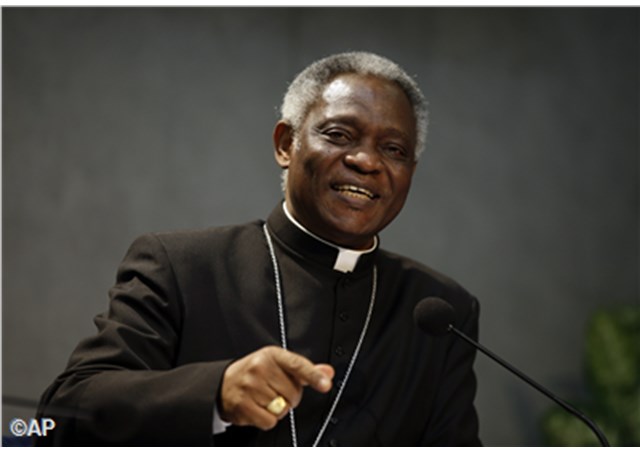
Cardinal Turkson: International trade must put service ahead of mastery

(Vatican Radio) Cardinal Peter Turkson, President of the Pontifical Council for Justice and Peace, has called for a fairer system of international trade that puts service ahead of mastery. In an address to participants at the Forum of the World Trade Organization (WTO) in Geneva, Cardinal Turkson noted that international trade has often led to widespread social exclusion and said trade can only matter to everyone when it benefits everyone and when no one is discarded or “thrown away.”
Please find below the full text of Cardinal Turkson’s address to the WTO Forum:
PONTIFICIUM CONSILIUM DE IUSTITIA ET PACE
Vatican City, 29 September 2014
Why Trade Matters to Everyone
Trade is nearly as ancient as humanity and plays a central role in the development and flourishing of peoples. Like music, it is one of the great international languages!
In our globalizing world, benefits surely flow from a more open trading environment - economic growth, innovation, employment opportunities, cultural enrichment. Trade can be an agent of development. The erection of tariff barriers contributed to the economic and political catastrophes between the two world wars of the last century. By contrast, dismantling protectionist measures and outlawing unfair preferences can help to create a more level playing field, including for the world's poorest countries. Still, the successes of modern business activity, including international trade, "even if they have reduced poverty for a great number of people - this is the great concern of Pope Francis - have often led to widespread social exclusion".'
For all freedom comes with responsibility. All liberty comes with a corresponding duty of justice. This is certainly true of the free movement of goods and services that underpins our system of international trade. "Free trade," said Pope Paul VI, "can be called just only when it conforms to the demands of social justice."' And justice is not served when trading partners are in unequal positions-in such a case, the "virtue" of competition deteriorates into the "vices" of economic manipulation and dictatorship.
Trade is unbalanced and unjust when it adds to the landscape of social exclusion - when it transgresses anyone's dignity anywhere in the world; when it neglects the common good of the whole of humanity; when it worsens the distribution of income; when it fails to create sustainable employment; when, worse, it takes advantage of human trafficking and modern slavery; and when in effect it bars the poor, the weak, and the vulnerable from participating in economic life.
Such a trading system cannot be justified when it protects or even enhances the ability of large corporations to cut corners, avoid paying taxes, and cavalierly discard workers rather than supporting the ability of the poor and marginalized to earn a decent living and live in dignity. It cannot be defended when it runs roughshod over basic human rights, refusing to hear the cries of the poor who toil long hours for scandalously low pay in unsafe working conditions. It cannot be defended when it treats the natural environment as yet another resource to be plundered, rather than a precious gift to be stewarded prudently and wisely, including with self-restraint.
In short, trade can only matter to everyone when it benefits everyone, and when no one is discarded or "thrown away". For this, we need a wide sense of responsibility on the part of all. Business must fulfill its true role as a noble vocation, prioritizing the global common good ahead of narrow self-interest. The WTO has an important role to play in forging a fairer system of international trade one that puts service ahead of mastery.
In conclusion, may I extend to this year's WTO Public Forum the same prayerful wish that Pope Francis offered to the WEF in Davos: "From such openness to the transcendent, a new political and business reality can take shape, one capable of guiding all economic and financial activity within the horizon of an ethical approach that is truly humane."
Cardinal Peter K.A. Turkson
President, Pontifical Council for Justice and Peace
| All the contents on this site are copyrighted ©. |


